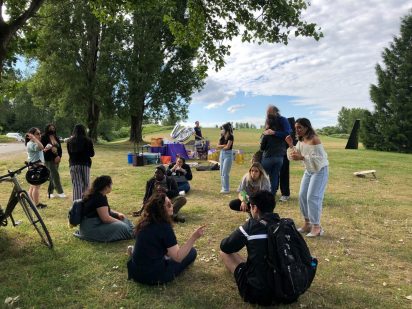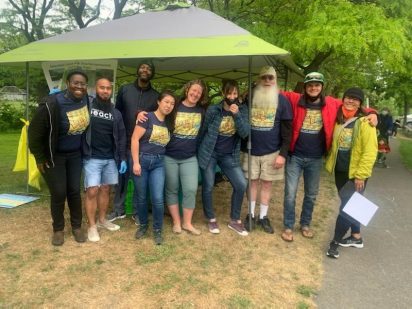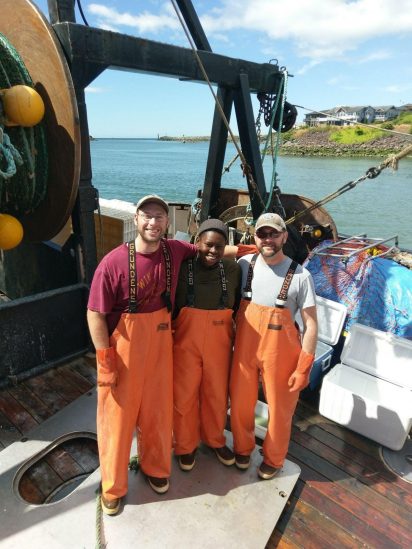Ashley Townes on Uplifting BIPOC Researchers – Interview Part II

Doctoral student Ashley Townes has traveled the world working with Indigenous groups and immersing herself in new cultures. She has arm-wrestled fishermen in Kochi, India and helped to raise a traditional Chinese fishing net and sort out the catch. She has broken bread with the only marine mammal researcher in Sri Lanka, Asha de Vos, discussing how to increase the representation of women and minorities in biological and fisheries sciences. Now at the UW School of Aquatic and Fishery Sciences (SAFS), Ashley continues to connect cultures and uses her communication skills to advocate for greater BIPOC representation in science and policy.
“In the first year at SAFS, I was the only African American in my program. Other people are going to join the crowd which I’m very happy about, but this increasing diversity is very new. We still see a lot of discrimination in the world against social identities, even if it’s the bottom line of the color of your skin. There’s just such blatant negativity sometimes because people can’t deal with being different.
But the SAFS community as a whole, and the student cohort, has really been magical. They are really trying to change things – it’s beautiful to witness and see things get done. The deaths of George Floyd and Breonna Taylor, and the Black Lives Matter movement, sparked a beautiful uprising at SAFS to advocate for change within the school. There are some necessary barriers to get through because of the history of fisheries sciences and racial discrimination in this country. So, I need great people in my corner to help me continue to persevere.
Representation matters. Our support services and systems in place need to be tailored to the individual and their background. Especially in higher education, advisors need to understand that when you take on a student or when you are in the position of giving guidance, you have to understand the whole being and their trajectory. Improved competence and empathy in this area is needed.
For many BIPOC students, we don’t have the same support systems or visual representation. That’s why mentorship, empowerment, and encouragement is so vital.”
Ashley takes this need for representation and mentorship to heart. Some of the key connections that Ashley has made at UW are with minority undergraduates looking to apply to graduate school. As a student advisor for the Ronald E. McNair Post-Baccalaureate Achievement Program, Ashley coaches students interested in aeronautics, ethnography, biochemistry, you name it, through their application process and what it’s like to navigate science as a BIPOC researcher.

“I believe my love for learning about different cultures and understanding the sense of belonging stems from my early international experience in Putney Student Travel’s pre-college program. As a rising high school senior, I received a full scholarship to participate in Putney’s summer program in Europe. I had the fantastic opportunity to study international relations and theatre at St. Hilda’s College of the University of Oxford, learn Italian in Tuscany, Italy and gain a deep understanding of the classical history and arts of Paris, France. This Putney experience with these three countries were foundational and put me on the early path of understanding and appreciating different cultural perspectives and people. It also led me to study for a year in Japan during my junior year at Tufts University.
Reflecting on that time, I am realizing more and more that reaching youth early, helping them understand that they belong and showing them the ways of getting from point A to point B is what it really comes down to. It’s just been so awesome to be a Graduate Student Assistant (GSA) in the McNair Scholars Program, paying it forward, and helping underrepresented students explore doctoral pursuits.
A few months ago I had a student say ‘I really want to apply to Emory or Johns Hopkins; I just don’t think it’s for me.’ I asked her why she felt that way and she said, ‘I just know’. Sadly, this outlook comes from one’s own history and experience – someone or something making them believe they don’t belong or won’t succeed. I think this is all the reason why, firstly, there is a need for supportive systems to debunk these false myths of one’s abilities and secondly, to increase the confidence that one is only limited by the dreams one has for oneself.
That’s why it’s important to be in their corner. Those students have this hesitancy about belonging – giving them what they need is what I love about my GSA position. I tell them, ‘Talk about nontraditional backgrounds, are you kidding me? I went from being a Japanese major to a PhD student in aquatic sciences!’ Nothing is linear. I know the stars appear to be ‘fixed’, but they do move and change shape gradually over time. You have to design your own constellation. That little dipper may look different to you. You can still dream and really obtain your dreams; you just need the steps and systems thinking. When I end a conversation with my McNair students, my hope is that they are smiling about their future endeavors.”
Ashley’s work to uplift BIPOC voices and values extends beyond the University of Washington. As a member of the City of Seattle’s Environmental Justice (EJ) Committee and as a volunteer with the Rainier Beach Link to Lake (L2L) Open Space Steering Committee, Ashley works to promote policies that help Seattle’s environment and the people of color who live in it.
“When I came to Seattle in 2015, Seattle did something incredibly unprecedented: they came out with the first of its kind environmental justice initiative. I thought that was such a showcase of accountability. Seattle is so homogenous and has a Black population of less than 7%. Yet, these small but mighty BIPOC-led organizations came together to do big things!
Now I’m directly a part of that work. In May, the Rainier Beach community’s efforts to improve Rainier Beach’s Be’er Sheva Park and Mapes Creek paid off big. Three members of the Rainier Beach L2L Open Space Steering Committee, including myself, wrote a grant proposal last year… As a result, we were recently awarded $700,000+ to rehabilitate and enlarge what remains of the Be’er Sheva Park’s lake-shoreline aquatic habitat, ecological community, and Tier 1 migration corridor.”

“The City of Seattle EJ Committee is a rainbow sprinkle cake, like a little UN. It’s extremely important to work in multicultural teams and have cultural identity be embedded in policy. It should be a foundational pillar in the work that we do. At the end of the day, it’s about the human impact. It’s been wonderful working with like-minded individuals and has been a great way to continue working on the community engagement I did previously in my earlier career. This social science perspective will complement and be integral to my natural science-focused doctoral research.”
While most of Ashley’s time is spent studying salmon behavior and modeling where salmon prefer to breed in the rivers of Alaska, she hopes to combine her love of fisheries science with her passion for social and environmental justice in the next stage of her career.

“My work has been tangentially tied to the Pebble Mine and how the extraction of copper and gold could detrimentally impact the evolution of sockeye salmon. Bristol Bay has one of the largest sockeye salmon runs in the world – it’s kind of like Lord of the Rings. The environment is so healthy and ecologically complex – it’s just a wonderland. I use my research to show how the habitats that salmon are attracted to are at risk of being destroyed by the Pebble Mine. On a fine scale, I know what salmon look for at the final stage in their lifecycle. That builds a case, advocacy, against the Pebble Mine.
Currently, I look to have a more direct connection with Indigenous Tribes, especially understanding their fishing and treaty rights. They have their own traditional ecological knowledge and how they forecast the salmon runs and when to stop fishing. I welcome the opportunity to be a part of the profound work with Tribes and strengthen Tribal relationships with scientists and policymakers.”
Be sure to read the first part of our interview with Ashley Townes, where we discuss more about her research, global travels, and skills at cross-cultural communication.
To read more about Ashley’s work in community engagement and collective action, check out her website.